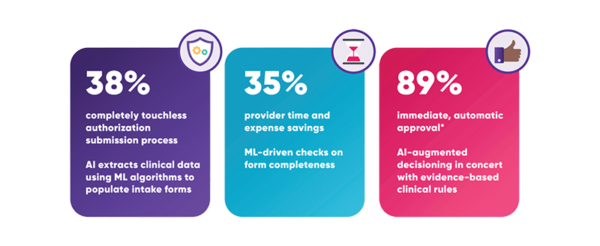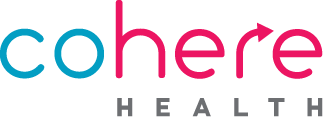Prior authorization is on the cusp of a significant transformation. With the growing adoption of artificial intelligence (AI), health plans have a tremendous opportunity to considerably improve operational efficiency, reduce provider burden, and enhance patient care via a transformed prior authorization process.
These five emerging trends in intelligent prior authorization will lay the foundation for a more streamlined, patient-centered process in 2025 and beyond.
Trend 1: Taking advantage of AI for real results
Forward-thinking health plans are already leveraging AI to achieve tangible results, addressing inefficiencies in areas like utilization and care management.
In utilization management, AI is helping to streamline the prior authorization process by improving intake procedures, expediting reviews, and providing decision support tools that ensure more accurate and timely decisions. Integration with provider and member data also ensures a smoother, more collaborative experience.
In care management, predictive models can identify patients who would benefit from outreach or clinical interventions. AI also helps steer care to the sites that offer the best clinical outcomes for a given patient, facilitates timely care transitions (such as discharge planning and remote monitoring), and even helps predict the likelihood of readmissions.
Cohere customers are using AI to achieve these example results today:

As more health plans adopt AI-driven processes, they can expect increased operational efficiency, reductions in administrative overhead, and better care outcomes.
Trend 2: Building processes to comply with new regulations
Health plans must ensure compliance with new CMS and state prior authorization regulations. The most innovative plans are embracing these regulatory changes as opportunities to drive greater efficiency, collaboration, and transparency. In 2024, the Centers for Medicare & Medicaid Services (CMS) passed the Interoperability and Prior Authorization Final Rule (CMS-0057-F), significantly shifting from the traditional prior authorization process toward greater transparency and automation.
The CMS rule strongly focuses on improving interoperability and reducing administrative burden; it mandates that health plans and providers share more data, creating a more transparent process.
AI can play a crucial role in meeting the new regulations by automating manual tasks, digitizing workflows, and improving communication between health plans and providers. Technologies like optical character recognition (OCR) and machine learning (ML) are also helping health plans comply with the forthcoming requirements while improving operational efficiency.
Key opportunities for leveraging AI in compliance:
- Automating data exchange: Seamlessly transferring prior authorization data between providers and health plans, ensuring compliance without increasing administrative workload
- Improved decision transparency: AI tools can give providers real-time updates on prior authorization status, including the rationale behind approvals or denials
- Faster turnaround time: AI-driven systems can expedite the request process, with as many as 90% of requests being approved immediately, depending on the specialty
Trend 3: Driving care quality with AI-powered nudges
AI has the potential to enhance not only the efficiency of prior authorization but also the quality of care. One of the most exciting recent AI developments has been the increased use of AI-powered nudges—automated, in-workflow alerts that guide healthcare providers toward better, more appropriate care decisions.
The impact of nudges:
- Reduction in denials and appeals: AI nudges can help avoid wasteful denials, appeals, and overturns, benefiting not only the health plan but also the patient and their providers
- Increased approval rates: Nudges ensure faster, more streamlined approval decisions by suggesting policy-compliant adjustments early in the process
- Improved provider satisfaction: Reducing the need for administrative back-and-forth helps providers focus on what they do best—delivering high-quality care
Nudges transform the prior authorization process from a gatekeeping mechanism to a tool that enhances collaboration, improves care decisions, and ultimately leads to better patient outcomes.
Trend 4: Predicting utilization trends earlier using AI
Through advanced data analytics and machine learning models, health plans can forecast trends in healthcare utilization with greater accuracy, identifying patterns in utilization months before they appear as claims.
Key benefits of predictive analytics:
- Proactive adjustments: Enables health plans to anticipate higher-than-expected utilization and associated costs
- Strategic predictions: Increases the accuracy and scope of predictions with year-over-year data sets
- Collaborative care: Identifies providers with atypical authorization trends for targeted intervention and collaboration opportunities
Predictive analytics powered by AI enable health plans to stay ahead of utilization trends, so that unanticipated changes in medical spend can be accounted for well before hitting the claims environment.
Trend 5: Establishing guardrails for AI in healthcare
Establishing clear guardrails will be essential as AI becomes more integrated into healthcare processes, including prior authorization. In 2025 and beyond, health plans must ensure that AI is used responsibly–emphasizing patient safety, privacy, and compliance.
AI must be implemented thoughtfully and ethically to support clinical expertise rather than replace it. Here are some important considerations as we move forward:
- Transparency in AI decision-making: Clinicians must understand how AI decisions are made, especially for prior authorization. Providing clear, understandable explanations of AI-driven decisions will be vital in maintaining trust
- Bias and fairness audits: Regular auditing of AI models will be necessary to ensure they are fair, accurate, and unbiased. Health plans must commit to ongoing evaluation and adjustments to their AI systems to mitigate risks of discrimination or inaccuracies
- Human oversight: While AI can automate many processes, human oversight will still be crucial to ensure that clinical expertise is applied when needed, particularly in complex or high-risk cases
Responsible AI principles will drive healthcare toward a future where technology enhances the role of clinicians, rather than replacing them.
Health plans, providers, and patients will all benefit from streamlined processes, improved care quality, and reduced administrative burdens. Now is the time for health plans to invest in these technologies and embrace the future of prior authorization.
Are you ready to take advantage of these trends?
Download our 2025 trends playbook to dive deeper into how AI can transform and future-proof your plan’s utilization management strategy.
*calculation based on a health plan’s implementation of Cohere Complete™.

